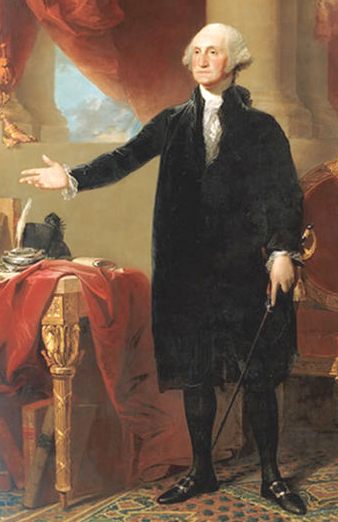

"When George Washington was a young man, he copied out a list of 110 “Rules of Civility and Decent Behavior in Company and Conversation.” Some of the rules in his list dealt with the niceties of going to a dinner party or meeting somebody on the street. “Lean not upon anyone,” was one of the rules.
“Read no letter, books or papers in company,” was another.
“If any one come to speak to you while you are sitting, stand up,” was a third.
"But, as the biographer Richard Brookhiser has noted, these rules, which Washington derived from a 16th-century guidebook, were not just etiquette tips. They were designed to improve inner morals by shaping the outward man. Washington took them very seriously. He worked hard to follow them. Throughout his life, he remained acutely conscious of his own rectitude.
David Brooks in the New York Times makes the point that the days of the 'dignity code' among today's public officials are history."
The rules that guided Washington and generations of people after him are simply gone.
"We can all list the causes of its demise.
"First, there is capitalism. We are all encouraged to become managers of our own brand, to do self-promoting end zone dances to broadcast our own talents.
"Second, there is the cult of naturalism. We are all encouraged to discard artifice and repression and to instead liberate our own feelings.
"Third, there is charismatic evangelism with its penchant for public confession.
"Fourth, there is radical egalitarianism and its hostility to aristocratic manners."
Mark Sanford's rambling and lack of reticence even in the glare of his infidelities, Sarah Palin's apparent inconstancy and erratic ambitions, Michael Jackson's inability to mature and adopt the rhythms of adulthood are listed as evidence in Brooks argument that modern leaders reflect our popular culture's rejection of restraint.
But then he finds himself face to face with Obama.: "Whatever policy differences people may have with him, we can all agree that he exemplifies reticence, dispassion and the other traits associated with dignity. The cultural effects of his presidency are not yet clear, but they may surpass his policy impact. He may revitalize the concept of dignity for a new generation and embody a new set of rules for self-mastery."
Uh-huh. Yes, he seems like a good husband and father and I'll take whatever positive cultural benefits I can get from a Democrat president who thankfully understands the role of interns differently than his party predecessor. But there is a public matter in which an enviable personal style and private morality cannot replace public respect for human dignity. Yes, it is the little and largely invisible problem of abortion and infanticide. For Brooks and Obama and Fr. Jenkins, it's probably those of us who keep rubbing the public's nose in the abortionist's dumpster who are lacking in restraint. We are extremists and zealots.
Paul told Timothy to preach in season and out of season. In other words, tell the truth even when you think others are sick of hearing it.
So here goes: Social conventions of restraint, reticence, and respect are grounded in the created dignity of the human person. If they are not rooted in the divine, then they are mere manners and etiquette, a product of society.
When our culture applauds a right for mothers to kill their offspring, when we segment off a portion of the human race and declare its members non-persons, when we merely slap the wrists of abortionists like Alberto Hodari when their negligence leads to the death of not just the unborn but their mothers as well, then we should recognize that we will be governed and entertained with a capriciousness that Washington abhorred.
C.S. Lewis wrote in Weight of Glory a passage that I've never heard applied to the abortion problem:
"It is a serious thing to live in a society of possible gods and goddesses, to remember that the dullest and most uninteresting person you talk to may one day be a creature which, if you saw it now, you would be strongly tempted to worship, or else a horror and a corruption such as you now meet, if at all, only in a nightmare. All day long we are, in some degree, helping each other to one or other of these destinations. It is in the light of these overwhelming possibilities[indeed one or the other is an eventuality], it is with the awe and the circumspection proper to them, that we should conduct all our dealings with one another… all friendships, all loves, all play, all politics.
"There are no ordinary people.
"You have never talked to a mere mortal.
"Nations, cultures, arts, civilization—these are mortal, and their life is to ours as the life of a gnat. But it is immortals whom we joke with, work with, marry, snub, and exploit—immortal horrors or everlasting splendors."


No comments:
Post a Comment